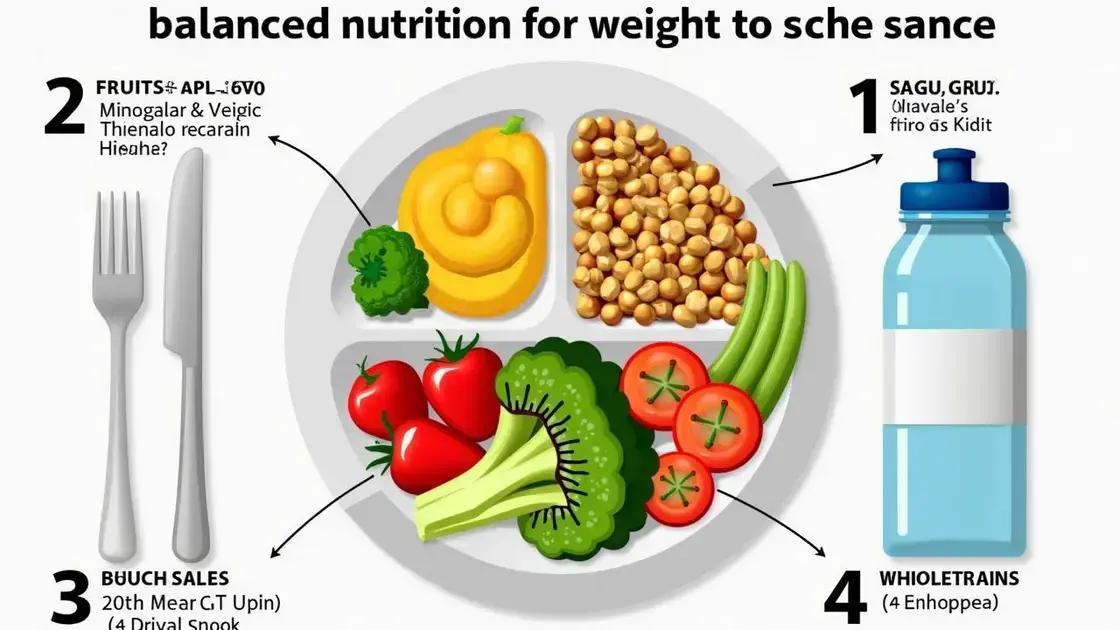To maintain a healthy weight without crash diets, focus on a balanced approach that includes mindful eating, regular exercise, and proper nutrition. Set realistic goals, recognize emotional eating triggers, and incorporate enjoyable physical activities into your routine for sustainable results.
Maintaining a healthy weight without crash diets is essential for overall well-being and longevity. In this article, we will explore effective strategies that allow you to achieve and sustain your ideal weight while enjoying your favorite foods. Understanding your unique body and its needs is crucial in developing a balanced lifestyle. With the right nutrition, exercise, and mindfulness practices, you can secure long-lasting results without the negative effects of diet fads.
Understanding Healthy Weight Goals

Understanding healthy weight goals is crucial for anyone looking to maintain a healthy lifestyle. When we set realistic and achievable goals, we create a roadmap for reaching our ideal weight. First, consider your individual needs. Everyone’s body is different, and what works for one person may not work for another.
Setting Realistic Targets
Start by determining your current weight and your desired weight. A safe and sustainable change is typically about 1 to 2 pounds per week. Focus on gradual progress rather than drastic changes, which can be harmful and hard to maintain.
Understand Body Composition
Weight is just one aspect of health. Understanding body composition is also important. This includes the percentage of fat, muscle, and bone in your body. A healthy weight goal might involve increasing muscle mass while reducing body fat, rather than just focusing on the number on the scale.
The Importance of a Balanced Approach
Your weight goal should be part of a broader health plan. Incorporate nutritional guidelines and regular physical activity to support your weight goals. Remember, maintaining a healthy weight is not just about dieting; it’s about creating lifelong habits.
Monitoring Your Progress
Track your progress regularly to see how you are doing. Use a journal or apps designed for health monitoring. This helps you stay accountable and make adjustments when needed. Celebrate small victories on your journey!
Listening to your body is key. If you feel hungry, sluggish, or overly restricted, it may be time to reassess your goals. Seek support from professionals, such as a nutritionist or a personal trainer, to help guide you.
The Role of Nutrition in Weight Maintenance

Nutrition plays a vital role in maintaining a healthy weight. What we eat affects our energy levels, mood, and overall health. Balanced nutrition is essential for successful weight maintenance.
Understanding Nutritional Basics
Eating the right mix of foods helps sustain energy and supports bodily functions. Focus on whole foods like fruits, vegetables, whole grains, and lean proteins. These foods are low in calories but high in nutrients, which is key for weight maintenance.
Portion Control and Mindful Eating
Controlling portions can help avoid overeating. Practice mindful eating by paying attention to your hunger cues and eating slowly. This allows you to enjoy your food and recognize when you’re full, reducing the chances of consuming extra calories.
The Importance of Hydration
Staying hydrated is often overlooked. Drinking water can help with weight control by making you feel full and reducing hunger. Aim for at least 8 cups a day, and consider drinking water before meals to aid in portion control.
Understanding Food Labels
Learning to read food labels is essential for making informed choices. Pay attention to calories, serving sizes, and nutrient content. This ensures that your food choices align with your weight maintenance goals. Foods with high fiber and low sugar can help keep you satisfied.
Incorporating a variety of foods can prevent boredom and promote a healthy relationship with food. Aim to include a rainbow of colors in your meals to ensure you’re getting a wide range of vitamins and minerals. Remember, the goal is to create a sustainable eating pattern that supports your long-term health.
Incorporating Exercise into Your Routine

Incorporating exercise into your routine is essential for maintaining a healthy weight. Regular physical activity boosts metabolism and helps burn calories. Finding enjoyable activities is the key to making exercise a habit.
Types of Exercise
There are many ways to stay active, including cardiovascular exercises like running, cycling, or swimming. Strength training, yoga, and Pilates also play an important role in overall fitness. Aim to include a mix of different activities to keep your workouts engaging and effective.
Creating a Balanced Schedule
When planning your exercise routine, try to include at least 150 minutes of moderate aerobic activity each week. This can be broken down into 30-minute sessions, five times a week. Additionally, incorporate strength training exercises at least two days a week to build muscle and increase metabolism.
Making Exercise a Habit
To make exercise a part of your daily life, set specific fitness goals. This could be running a certain distance or doing a set number of workouts each week. Be realistic about your time and energy levels, and start with small, manageable goals that you can build on over time.
Staying Motivated
Staying motivated can be a challenge. You might find it helpful to work out with a friend or join a class to create a support system. Tracking your progress with a journal or app can also keep you engaged. Lastly, remember to celebrate your achievements, no matter how small.
Combining exercise with regular physical activity throughout your day, like walking or taking the stairs, further contributes to weight maintenance. A balanced approach to exercise will help you feel better, enhance your productivity, and maintain your healthy weight.
Mindfulness and Weight Management Strategies

Mindfulness plays an important role in weight management strategies. It helps you become more aware of your eating habits and emotional triggers. Mindful eating is about paying attention to what you eat and how it makes you feel.
Practicing Mindful Eating
When you eat, try to minimize distractions. This means putting away your phone, turning off the TV, and focusing on your meal. Savor each bite and listen to your body’s hunger cues. Eating slowly gives your brain time to register fullness, reducing the chance of overeating.
Identifying Emotional Triggers
Many people eat in response to stress, boredom, or sadness. Keeping a food journal can help you identify patterns in your eating habits. Note how you feel before and after meals. Recognizing these emotional triggers allows you to find healthier coping strategies instead of turning to food.
Setting Realistic Goals
Set achievable weight management goals that align with your lifestyle. Instead of focusing solely on weight loss, think about habits you can change. For example, aim to add more fruits and vegetables to your meals or increase your water intake. These small changes can lead to better outcomes over time.
Using Mindfulness Techniques
Incorporate mindfulness techniques such as meditation or deep breathing exercises into your daily routine. These practices can help reduce stress and improve your overall mindset towards food. When you feel more balanced, you’re less likely to make impulsive eating decisions.
Combining mindfulness with a balanced diet and regular exercise creates a comprehensive approach to weight management. This holistic strategy not only supports physical health but also fosters a positive relationship with food and your body.
In Summary: Maintaining a Healthy Weight
Maintaining a healthy weight without crash diets is achievable through a balanced approach that incorporates mindful eating, regular exercise, and proper nutrition. By setting realistic weight goals and understanding the role of food in your daily life, you can create sustainable habits.
Incorporating mindfulness strategies can help you recognize emotional eating triggers, allowing for better decision-making. Additionally, developing an exercise routine that you enjoy can make staying active a part of your lifestyle.
Remember, healthy weight management is not about perfection; it’s about progress and creating a healthier, happier you. Commit to your journey, and embrace each step toward better health.
FAQ – Frequently Asked Questions about Maintaining a Healthy Weight
What is mindful eating and how does it help with weight management?
Mindful eating involves paying full attention to the eating experience, savoring each bite, and recognizing hunger and fullness cues. This practice helps prevent overeating and emotional eating.
How much exercise should I incorporate into my routine?
Aim for at least 150 minutes of moderate aerobic activity each week, along with strength training twice a week. Find activities you enjoy to stay motivated.
What are realistic weight goals?
Realistic weight goals typically involve gradual changes, such as losing 1 to 2 pounds per week. Focus on developing healthy habits rather than quick fixes.
How can I identify emotional triggers that lead to overeating?
Keeping a food journal can help you track patterns in your eating habits. Note your feelings before and after meals to identify emotional triggers.
What role does nutrition play in maintaining a healthy weight?
Proper nutrition provides essential nutrients and fuels your body. A balanced diet helps manage hunger, supports energy levels, and promotes overall health.
How can I stay motivated in my weight management journey?
Set achievable goals, track your progress, and celebrate small victories. Working out with friends or joining classes can also help keep you accountable.













